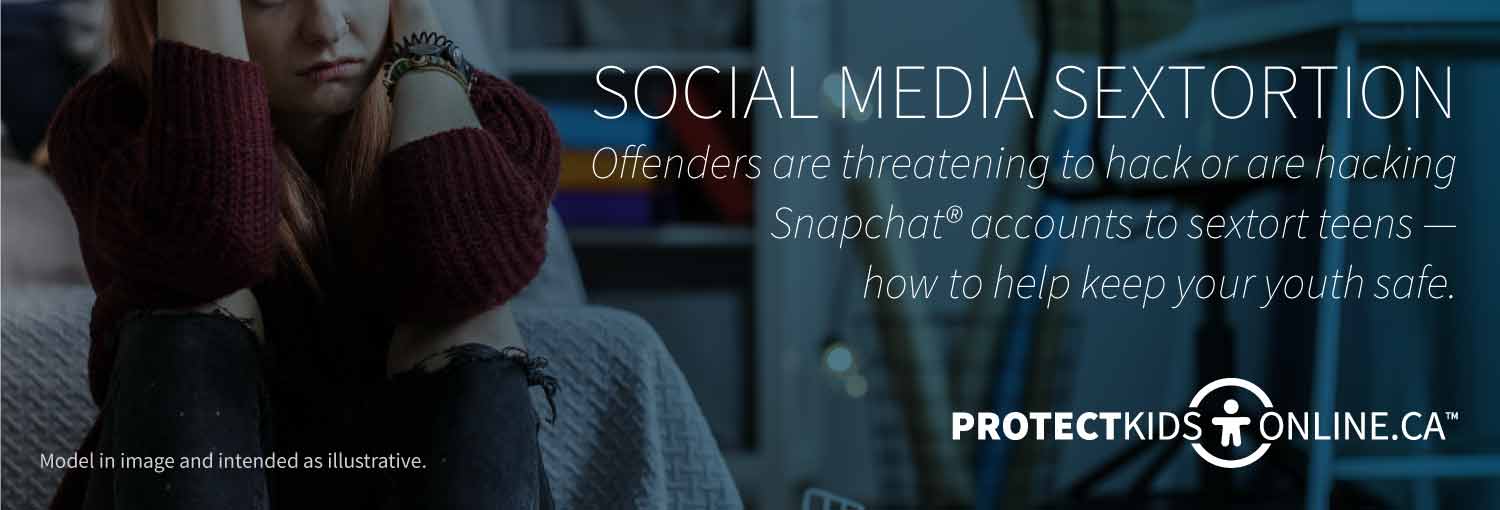Social Media Sextortion
Offenders are threatening to hack or are hacking Snapchat® accounts to sextort teens — how to help keep your youth safe.

Cybertip.ca, Canada’s tipline for reporting the online sexual exploitation of children, is seeing an alarming trend in reports from teens who have had their Snapchat accounts hacked and had their intimate images or videos shared on the social media platform.
Since August 2021, both Cybertip.ca and the Canadian Centre for Child Protection, which operates Cybertip.ca, have received a combined 27 reports related to this extortion trend. In some cases the perpetrator threatened to hack their Snapchat account and share intimate images of the teen. In other cases, the teen’s Snapchat account was hacked and intimate images were distributed as a result. Some tactics the offenders used included:
- Contacting the teen through direct message on Snapchat, mentioning they have seen naked pictures of the teen on a site or they have naked pictures of the teen taken from the teen’s My Eyes Only folder (private snaps saved in the app that have a passcode) in Snapchat.
- Providing a link to an external site or a page to “recover” their email and password, then using the information entered by the teen to take over their account.
- Adding the teen’s friends on Snapchat or sending a picture of the teen’s followers as a manipulation tactic.
- Stalking the teen online and persistently contacting them until they comply with the demands.
- In some instances the teen had previous interactions with the offender on Snapchat or other platforms prior to being threatened.

In a number of the cases reported to Cybertip.ca, the teen’s intimate images were in fact shared either on the offender’s Snapchat story, the teen’s hacked Snapchat story, or were sent directly to the teen’s contacts the offender added or threatened to share with.
In almost every report the offender demanded money in order to keep the offender from hacking the teen’s account or sharing the imagery they had already obtained. However, in a few reports the perpetrator asked for additional content (e.g., more intimate images/videos) in order for the imagery not to be shared.
Snapchat is among a variety of platforms used to target teens. In a September 2021, Cybertip.ca Alert, the tipline noted a 62% increase reports of teens being sextorted across a number of every day apps and platforms. It’s common to see initial contact on Omegle™ or Instagram®, and then the communication moving to Google+ Hangouts® or Skype®, where teens are coerced to undress on camera.

What should caregivers do if their teen is being sextorted?
- Report it. Report what has happened to police or to Cybertip.ca through the online report form or via the toll‑free number at 1-866-658-9022.
- Do not comply with the threat. In other words, never pay money and ensure your teen never sends additional images/video. The situation will NOT get better by doing either of these things.
- Stop all communication with the person making the threat. However, make sure to keep any correspondence between your teen and the person threatening them.
What should caregivers do if their teen’s image or video has been shared?
- Contact Cybertip.ca. Cybertip.ca can:
- Provide practical steps to help regain control over the situation.
- Help to get child sexual abuse material or intimate images of a teen removed from the platform. Cybertip.ca analysts can also help guide you on actions to take to have it removed yourself, if you prefer.
- Connect you and your teen to the Canadian Centre for Child Protection’s support service team who work extensively with teens, schools, and families during instances of sextortion. They can help with everything from emotional support to connecting you with therapy or victim services, if needed.

How can I help my teen protect themselves on social media platforms, like Snapchat?
- Parents and caregivers, a quick reminder that Snapchat’s Terms of Service (outside the U.S.) states users must be 13+ to have an account with the app.
- Talk with your teen about only adding people/followers they know in real life. On Snapchat, encourage your teen to block random/unknown users who add them.
- Tell your teen not to click on or access links/websites sent to them through direct messages, especially if they don’t know the individual sending the link.
- Work with teens on privacy settings. For Snapchat in particular, review the Who Can section under Settings to modify and limit who can contact your teen, view their stories, see them in Quick Add, and see their location.
- Encourage your teen to create a strong password for their social accounts.
- Remind your teen to limit the amount of information about themselves in their profile details. Snapchat profiles can include users’ full names, their birthday, and star sign. Encourage teens to use a pseudonym and disable Birthday Party, which will remove their birthday details. Learn more about how to ensure your teen’s social media bio isn’t giving away too much personal information.
- Let your teen know that material in their My Eyes Only section of their Snapchat account is not as secure as they may think and to carefully consider what is stored/shared there.
- Encourage your teen not to share their Snapcode (a unique QR code that allows people to quick add users to their Snapchat) or other social media usernames online.
- Have regular conversations about online safety – talk about the apps they use, games they play, and who they’re connecting with. For tips on how to get the conversation started with kids and teens of all ages, visit protectkidsonline.ca.
- Remind teens they can always come to you for help if something has happened without fear of getting in trouble or losing their device.